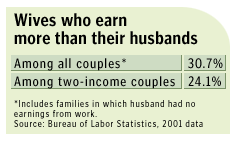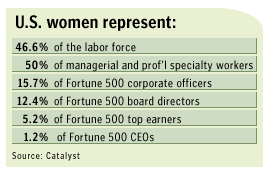
NEW YORK (CNN/Money) -
You've heard about the wage gap. On average, women earn less than men, when you take a measure of the total U.S. working population. But a growing number of women are outpacing the men -- specifically, their husbands.
In fact, 24 percent of working wives now earn more than their working husbands, according to the Bureau of Labor Statistics (BLS). If you count working women married to jobless men, that number jumps to 30 percent. In other words, nearly 1 out of 3 married women make more than their spouses.

If you think it's just high-earning women whose paychecks trump those of their mates, think again. Only 3 percent of the cases in which wives outearn their husbands involve salaries greater than $75,000, according to the BLS.
Women earning more is good news for their own welfare and that of their families. Arguably, it can even be good news for their husbands, who may have grown weary of being the main breadwinner. A well-paid wife may give some men the opportunity to take jobs that are fulfilling rather than just well-paying.
Let's face it, though: when a wife outearns her husband, it still can make some people uncomfortable. Namely, the man, the woman or the couple's friends and family. Here are some typical responses when folks are less comfortable than they might admit:
The man feels threatened. Randi Minetor, author of "Breadwinner Wives and the Men They Marry," said that small disparities in income cause the fewest difficulties. Both sides also have an easier time when they begin their life together knowing the woman's career choice is more lucrative. But there's a greater chance for conflict when a woman's salary jumps far ahead of the man's, displacing him as top earner, or when the man loses his job.

If a man lives in what anthropologist Helen Fisher calls a "win-lose" world -- where the goal is to topple the person on top -- that can make for tense relations at home. Indeed, Minetor, who studied 60 couples for her book, found competition is one of the biggest problems couples can face.
The less comfortable a man is with his wife's earning power, the more likely he is to react badly, Minetor said. In one couple whom financial educator Ruth Hayden was advising, the husband wanted his wife to sign a statement swearing she wouldn't change as a result of her bigger paycheck.
The woman feels resentful and guilty. In her research, Minetor found that regardless of a woman's income, the wife often tends to be the primary housekeeper. When she also becomes the primary breadwinner, it can lead to further resentment if she's not getting the benefit of a partner who does 50 percent of the housework.
Part of the problem is that women don't always demand their fair share of help, Minetor said. There's still a sense among some women that if their table isn't dusted properly, it reflects poorly on them. "So we have a lot of overcompensating," she observed.
Outsiders can be disparaging. Minetor, who runs an advertising agency, brings home a bigger paycheck than her lighting-designer husband. She knows all too well how others may perceive men who don't earn "enough." "People tell you he's lazy, he's taking advantage of you, he'll never amount to much, he's a gold digger," she said.
If it's not clear which spouse earns more, outsiders often assume it's the man, she said. Salespeople may bypass the wife and speak to the husband. Or guests at a party might ask about the husband's work but not the wife's.
It's all about the past ... to a point
It's reasonable to assume these reactions are rooted in cultural expectations formed in the past, when men were the providers and women their home-based helpmates. But anthropologist Fisher argues that if we dig a little deeper -- say, into our pre-agrarian past more than 10,000 years ago -- we'll find a different version of "how things used to be."
| RELATED ARTICLES
|

|
|
|
|
Yes, men were the hunters and women the gatherers. But what that meant was that women were responsible for pulling together at least 60 percent of dinner -- vegetables, fruits, and nuts -- every night, Fisher said.
Since food was the pre-agrarian equivalent of money, women had plenty of economic power. So you might say women outearning their husbands is a trend that's actually helping to bring both sexes back into balance.
"We're moving from the traditional marriage to the peer marriage," Fisher said. "And that's much more compatible with the ancient spirit."
So, what are we moderns to do?
For those of us still driven by our 20th-century spirits, however, woman as money bags could take some getting used to.
For couples struggling with the issue, Hayden, author of "For Richer, Not Poorer," suggests they have a money meeting once a month for an hour.
The point of the meeting is both practical -- an opportunity to discuss how you'll pay for upcoming expenses -- and emotional -- a way to help both partners move past their preconceptions by discussing how each feels about the way money is handled.
Ultimately, Hayden said, you want to get to a point where money is not so much about power since often the fear is that the person with more money has more control.
She credits her husband with having an enlightened attitude. In the mid-1980s, when Hayden's income surpassed his, she asked if that was going to be a problem for him. After thinking for awhile, he told her, "No, it would be fun to have more money. We've never had the belief that who has more money has more say."
Jeanne Sahadi writes about personal finance for CNN/Money.com. She also appears regularly on CNNfn's "Your Money," which airs weeknights at 5 p.m. For comments on this column or suggestions for future ones, please e-mail her at everydaymoney@cnnmoney.com.

|

